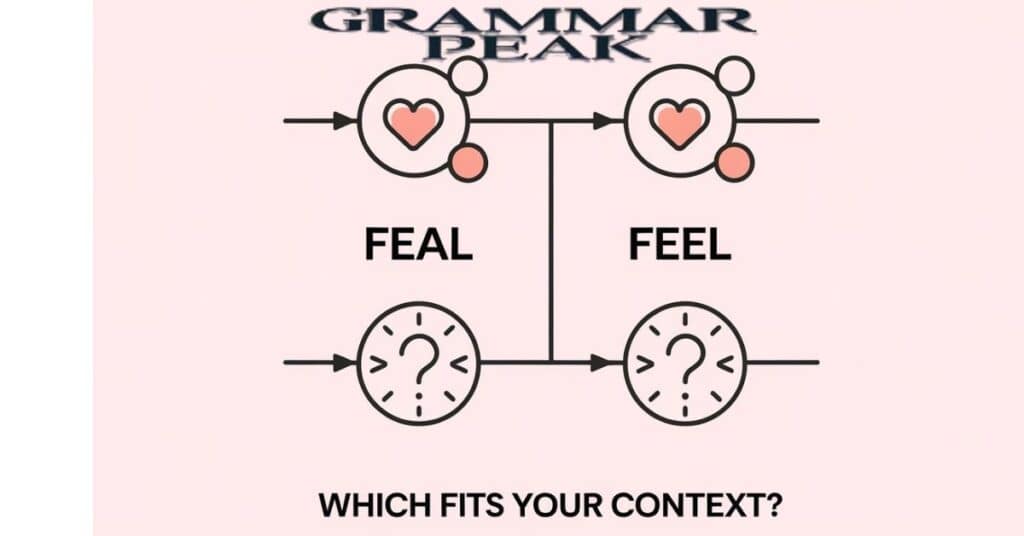The difference between “Feal vs Feel” is essential to improve your communication skills. These two words often cause confusion due to their similar sounds. However, they have distinct meanings and uses.
In this article, we will explore the meaning of Feal and the meaning of Feel, their origins, differences, and how to use them correctly. By the end, you will feel confident in your ability to choose the right word!
What Does the Word “Feal” Mean?
The word “feal” is not commonly used in everyday conversation. It is an archaic term that means loyal or faithful. When someone describes a person as feal, they imply that the person is devoted or trustworthy.
This word has its roots in Old French and can also be traced back to Proto-Germanic origins. It reflects a sense of loyalty that was highly valued in historical contexts.In modern English usage, you might not hear feal very often.
You Might Be Feal vs Feel: Which One Should You Use?
Origins of the Word “Feal”
The origins of the word “feal” can be traced back to the Middle English terms and Old French. It has its roots in the Latin word “fidelis,” which means faithful. This etymology reflects how loyalty and faithfulness have been significant throughout history.
In historical texts, you might find feal used to describe knights or warriors who were loyal to their lords. This loyalty was crucial in the feudal system, where allegiance often meant the difference between life and death. The concept of feal is deeply embedded in the values of loyalty and devotion.
What Does the Word “Feel” Mean?
The word “feel” is much more common in modern English. It is a versatile word that can serve as both a verb and a noun. As a verb, feel refers to the act of perceiving through physical sensations or emotional experiences.
when you touch something hot, you might say, “I feel the heat.” It can also describe emotional perception, such as saying, “I feel happy.”As a noun, feel can refer to the quality of a sensory experience. For instance, you might describe the feel of a fabric as smooth or rough. This dual usage makes feel an essential part of everyday language.
Here’s a table summarizing the main meanings of the word “feel”:
| Meaning | Description |
| Physical Sensation | The perception of touch, temperature, or pain through the skin or body. |
| Emotional Experience | The awareness or experience of emotions, such as happiness, sadness, or anger. |
| Intuition | A sense or instinct about something without relying on reasoning or evidence. |
| Impression | The overall effect or atmosphere of a situation or object, often subjective. |
| Connection | The bond or rapport felt between individuals, often in relationships. |
This table gives a concise overview of the various meanings associated with the word “feel.”
Origins of the Word “Feel”
The etymology of feel is fascinating. It dates back to Old English terms and has evolved through various languages. The word feel comes from the Proto-Germanic word “feulan,” which means to touch or perceive.
This connection highlights the importance of sensory perception in the understanding of the term.Throughout history, feel has maintained its relevance. It is frequently used in literature to convey emotions and physical sensations. Poets and writers often use feel to describe characters’ inner worlds and their reactions to external stimuli.
Read More About Feal vs Feel: Which One Should You Use?
Here’s a table summarizing the origins of the word “feel”:
| Aspect | Details |
| Old English | The word “feel” comes from the Old English term felan, meaning “to touch or perceive.” |
| Etymology | It is possibly derived from the Proto-Indo-European (PIE) root *pal-, meaning “to touch.” |
| Related Terms | The PIE root *pel- also means “to thrust, strike, drive,” which relates to perception. |
| Historical Usage | The noun form of “feel” emerged in the early 13th century, referring to “sensation” or “understanding.” |
| Evolution of Meaning | Over time, “feel” has expanded to include emotional and intuitive experiences, alongside physical sensations. |
This table provides a concise overview of the origins and evolution of the word “feel.”
“Feal” vs “Feel”: The Differences
When comparing feal vs feel, the differences become clear. Feal refers specifically to loyalty or faithfulness, while feel encompasses a broader range of meanings related to sensory experiences and emotions.
To illustrate, consider the following table that highlights these differences:
| Aspect | Feal | Feel |
| Meaning | Loyal, faithful | Sense, perceive, experience |
| Usage | Archaic, poetic language | Common, everyday language |
| Part of Speech | Adjective, sometimes a verb | Verb and noun |
| Context | Loyalty, historical contexts | Emotional and physical sensations |
Understanding these differences helps clarify when to use each word. Choosing the right term can significantly affect the message you convey.
Synonyms for “Feal” and “Feel”
Here are 12 synonyms for “Feal,” each with a corresponding
- Loyal
- Faithful
- Devoted
- Steadfast
- Allegiant
- Constant
- Unwavering
- True
- Trustworthy
- Reliable
- Dedicated
- Fervent
These synonyms capture the essence of loyalty and faithfulness associated with the word “feal.”
Synonyms for feel
Here are 12 synonyms for “feel,” each with a corresponding
- Sense
- Perceive
- Experience
- Touch
- Detect
- Discern
- Notice
- Recognize
- Relate
- Emote
- Affect
- Savor
These synonyms reflect the various meanings associated with “feel,” including physical sensations and emotional experiences.
Examples in Context
Understanding how to use feal and feel in sentences is crucial for effective communication. Here are some examples to illustrate their usage:
feal (adj.)
Here are 10 sentences using “feal” as an adjective:
- The loyal dog remained feal to its owner, never leaving his side.
- Throughout the years, she proved to be a feal friend, always offering support.
- The feal soldier fought bravely in battle, never wavering in his duty.
- He received accolades for his feal commitment to the community.
- Their feal allegiance to the cause inspired others to join the movement.
- The feal knight pledged his life to protect the realm from invaders.
- She admired his feal devotion to his family, always putting them first.
- In the face of adversity, his feal spirit shone brightly, motivating his peers.
- The feal companion stood by her through thick and thin, proving true loyalty.
- Their feal partnership in business allowed them to thrive against the competition.
feal (v.)
Here are 10 sentences using “feal” as a verb:
- The knight vowed to feal his promises, ensuring he would always be loyal to his lord.
- In his heart, he knew he would feal the trust his friends placed in him.
- She decided to feal her commitments, never breaking a promise to her family.
- As a faithful companion, he would feal his loyalty even in the toughest times.
- The hero chose to feal his oath, standing firmly by his comrades in battle.
- During the ceremony, he pledged to feal his allegiance to the crown.
- The soldier swore to feal his duty, protecting his homeland at all costs.
- She felt compelled to feal her devotion to the charity she supported for years.
- In the story, the character chose to feal his word, despite the risks involved.
- The leader encouraged his followers to feal their promises to one another for unity.
feel (n.)
Here are 10 sentences using “feel” as a noun:
- The soft blanket had a comforting feel that made her relax instantly.
- I love the feel of the warm sun on my skin during summer days.
- The artist captured the feel of joy in his vibrant painting.
- There is a special feel to the old library that makes it a favorite spot.
- The feel of the fabric is important when choosing the right clothes.
- She described the feel of the ocean breeze as refreshing and invigorating.
- The feel of the moment was electric as the crowd cheered for the performer.
- It’s hard to explain the feel of excitement that comes before a big event.
- The feel of nostalgia washed over him as he looked through old photographs.
- A good book can create a unique feel that transports you to another world.
FAQ” S
What is the meaning of “feal”?
Feal means loyal or faithful, often used in historical or poetic contexts.
What does “feel” refer to?
Feel refers to the act of sensing or experiencing something, both physically and emotionally.
Are “feal” and “feel” homophones?
Yes, they sound similar but have different meanings and usages.
What are synonyms for “feal”?
Synonyms include loyal, faithful, and devoted.
How can I use “feel” in a sentence?
You can say, “I feel happy when I am with my friends.”
Conclusion
Understanding “Feal vs Feel” is essential for effective communication. While feal carries the meaning of loyalty and faithfulness, feel encompasses a broader range of sensory and emotional experiences. By knowing the meaning of Feal and the meaning of Feel, along with their origins and usage, you can express yourself more clearly and accurately. Remember to choose the right word based on context, and your communication will be more impactful.

Mason Blake is an experienced blogger with a passion for language and communication. With years of expertise in crafting informative and engaging content, Mason shares valuable insights on grammar and writing. His clear, concise, and reader-friendly approach has earned him a loyal following, helping readers sharpen their language skills and master the art of effective communication.








I don’t think the title of your article matches the content lol. Just kidding, mainly because I had some doubts after reading the article.
I don’t think the title of your article matches the content lol. Just kidding, mainly because I had some doubts after reading the article.
Can you be more specific about the content of your article? After reading it, I still have some doubts. Hope you can help me.
Your article helped me a lot, is there any more related content? Thanks!